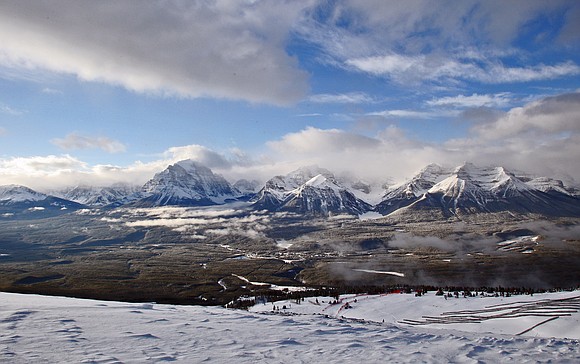Traveling to Canada during Covid-19: What you need to know before you go
CNN/Stylemagazine.com Newswire | 7/20/2021, 9:42 a.m.

Originally Published: 30 DEC 20 06:45 ET
Updated: 20 JUL 21 10:33 ET
CNN Staff
(CNN) -- If you're planning to travel to Canada, here's what you'll need to know and expect if you want to visit during the Covid-19 pandemic.
The basics
Canada's Covid-19 situation has improved dramatically in recent months, and it's now reporting fewer than 400 cases a day on average.
As of July 5, the Canadian government has eased its mandatory two-week quarantine requirement for fully vaccinated nationals and residents arriving in the country after traveling abroad.
Beginning August 9, fully vaccinated citizens and permanent residents of the United States currently residing in the US will be permitted to enter Canada.
Vaccinated international travelers may also be allowed to enter Canada beginning September 7, provided the "Covid-19 epidemiology remains favorable," the Canadian government said in a statement.
Entry to Canada remains prohibited for all foreign travelers who are not fully vaccinated.
What's on offer
This is the ultimate destination for adventure. Whether it's skiing and snowboarding in the Rockies or bear watching in the wilds of Ontario, Canada has everything to satisfy travelers who want to spend time in the great outdoors.
Vancouver, Toronto, Montreal and Quebec City are all perfect for city breaks, with first rate culture, food and entertainment on offer.
Who can go
Citizens and permanent residents are allowed to enter Canada, but if unvaccinated they must quarantine for 14 days.
Vaccinated US citizens and permanent residents will be permitted to enter Canada from August 9. International travelers may enter from September 7 if conditions remain favorable.
A few conditions still apply for all travelers, however. People older than five flying into Canada are required to provide written or electronic documentation showing they received a negative result from a Covid-19 PCR or RT-LAMP test conducted within 72 hours before their scheduled boarding.
A three-night government authorized hotel stay requirement now in place for some travelers will be eliminated on August 9.
Immediate and extended family members, including those without Canadian citizenship, can enter for any reason as long as they are staying in the country for more than 15 days (the quarantine rule remains unchanged for now).
Those coming for fewer than 15 days can only enter for an essential purpose.
All extended family members (but not immediate family) must also have written permission from Immigration, Refugees and Citizenship Canada (IRCC). For more information, click here. Only essential travel and transiting passengers are otherwise allowed.
As for travelers arriving by land, all visitors -- with some exceptions -- are also required to provide proof of a negative Covid-19 molecular test result taken in the United States within 72 hours of pre-arrival, or a positive test taken 14 to 90 days before arrival.
What are the restrictions?
Earlier this year, Canada implemented further testing and quarantine requirements for international travelers arriving in Canada by air and land, some of which will end on August 9. Only four major airports are accepting international flights: Montreal, Toronto, Calgary and Vancouver.
From August 9, international flights will be permitted to land at the following five additional Canadian airports: Halifax Stanfield International Airport; Québec City Jean Lesage International Airport; Ottawa Macdonald-Cartier International Airport; Winnipeg James Armstrong Richardson International Airport; and Edmonton International Airport.
All permitted arrivals must use the ArriveCAN app or website to submit travel and contact information, a 14-day quarantine plan (if unvaccinated) and a Covid-19 symptom self-assessment.
The quarantine plan must detail where you will stay, how you will get there and how you will arrange for delivery of essentials such as groceries and medicine. Failure to stick to the plan can lead to six months' jail time and a CAD$750,000 (US$593,000) fine.
Additionally, all arrivals are given a health screening by a border officer to assess any symptoms.
You can keep up with detailed travel rules among the provinces here.
What's the Covid-19 situation?
Canada is now in the midst of a nationwide Covid-19 vaccine program.
According to Canada's official vaccine tracker, nearly 70% of the population has received at least one vaccine dose and about 50% of the population is fully vaccinated.
Canada dealt with the initial wave of Covid-19 well. However, a deadly second wave in late 2020 led to new lockdowns.
Case numbers continue to drop and multiple provinces are easing their restrictions in response.
What can visitors expect?
Mask mandates vary between provinces.
Multiple provinces are relaxing the rules on social gatherings, indoor dining and travel in line with reduced case counts and rising vaccination rates, including Alberta and British Columbia.
Quebec eased restrictions from May 28, dropping a curfew and allowing restaurants to serve patrons on their terraces.
Ontario has unveiled a three-stage reopening plan, with restaurants now allowed to serve patrons outside. From July 16, restaurants in that province are allowed to resume indoor dining.
Prince Edward Island, Canada's smallest province, has adopted some of the country's strictest Covid-19 prevention measures, with nonresidents needing to apply for approval to visit in advance.
Most Canadian provinces continue to advise people to keep a distance of two meters (6.5 feet) to cut the spread of the virus.
Useful links
Our recent coverage
Ottawa made it into our list of best winter cities. We've looked at Old Quebec's European charm. And if you're into extreme skiing, Canada has options here. The Revitalization Project tattoos women in the remote Inuit communities.




